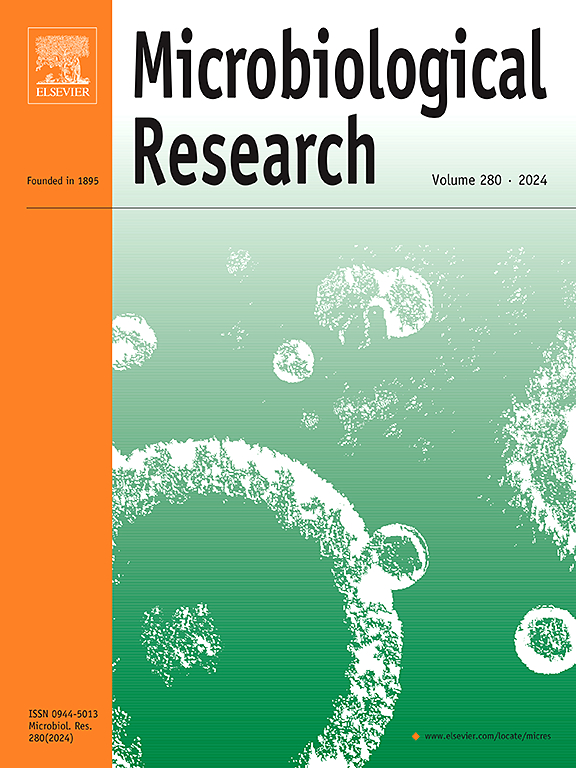Rootstocks and drought stress impact the composition and functionality of grapevine rhizosphere bacterial microbiota
IF 6.1
1区 生物学
Q1 MICROBIOLOGY
引用次数: 0
Abstract
The microbiota, a component of the plant holobiont, plays an active role in the response to biotic and abiotic stresses. Nowadays, with recurrent drought and global warming, a growing challenge in viticulture is being addressed by different practices, including the use of adapted rootstocks. However, the relationships between these practices, abiotic stress and the composition and functions of the rhizosphere microbiota remain to be deciphered. This study aimed to unravel the impact of five rootstocks, water management and the combination of both on the rhizosphere bacterial microbiota in grapevines using shotgun metagenomics approach. The results showed that drought impacted the diversity, composition and functionality of the rhizosphere bacterial community. The genera Mycolicibacterium, Mycobacterium and Rhodococcus, and the bacterial functions, including DNA damage repair, fatty acid synthesis, sugar and amino acid transport, oxidative stress reduction, toxin synthesis and detoxification of exogenous compounds were significantly enriched under drought conditions. Rootstocks also significantly affected the rhizosphere bacterial richness but its influence on diversity and functionality compared to water management was weaker. Some taxa and function could be linked to water managements applied. The interaction between rootstocks and water management further influenced the rhizosphere composition, especially under drought conditions, where distinct clustering was observed for specific rootstocks. The results highlight the importance of conducting multifactorial studies to better understand their impact on shaping functional rhizosphere bacterial communities. This study paves the way for future research on beneficial bacterial inoculation and genetic engineering of rootstock to cope with drought stress.
砧木和干旱胁迫对葡萄根际细菌微生物群组成和功能的影响。
微生物群是植物整体生物的一个组成部分,在应对生物和非生物胁迫中起着积极的作用。如今,随着干旱和全球变暖的反复出现,葡萄栽培面临着越来越大的挑战,需要通过不同的实践来解决,包括使用适应性砧木。然而,这些做法、非生物胁迫与根际微生物群的组成和功能之间的关系仍有待破译。本研究旨在利用散弹枪宏基因组学方法揭示5种砧木、水分管理及其组合对葡萄根际细菌微生物群的影响。结果表明,干旱影响了根际细菌群落的多样性、组成和功能。在干旱条件下,细菌的DNA损伤修复、脂肪酸合成、糖和氨基酸运输、氧化应激还原、毒素合成和外源化合物解毒等功能显著增强。砧木对根际细菌丰富度也有显著影响,但其对细菌多样性和功能的影响弱于水分管理。一些分类群和功能可以与应用的水管理联系起来。砧木与水分管理之间的相互作用进一步影响根际组成,特别是在干旱条件下,在特定砧木中观察到明显的聚类。这些结果强调了进行多因素研究以更好地了解它们对形成功能根际细菌群落的影响的重要性。本研究为今后开展有益菌接种和砧木抗旱基因工程研究奠定了基础。
本文章由计算机程序翻译,如有差异,请以英文原文为准。
求助全文
约1分钟内获得全文
求助全文
来源期刊

Microbiological research
生物-微生物学
CiteScore
10.90
自引率
6.00%
发文量
249
审稿时长
29 days
期刊介绍:
Microbiological Research is devoted to publishing reports on prokaryotic and eukaryotic microorganisms such as yeasts, fungi, bacteria, archaea, and protozoa. Research on interactions between pathogenic microorganisms and their environment or hosts are also covered.
 求助内容:
求助内容: 应助结果提醒方式:
应助结果提醒方式:


